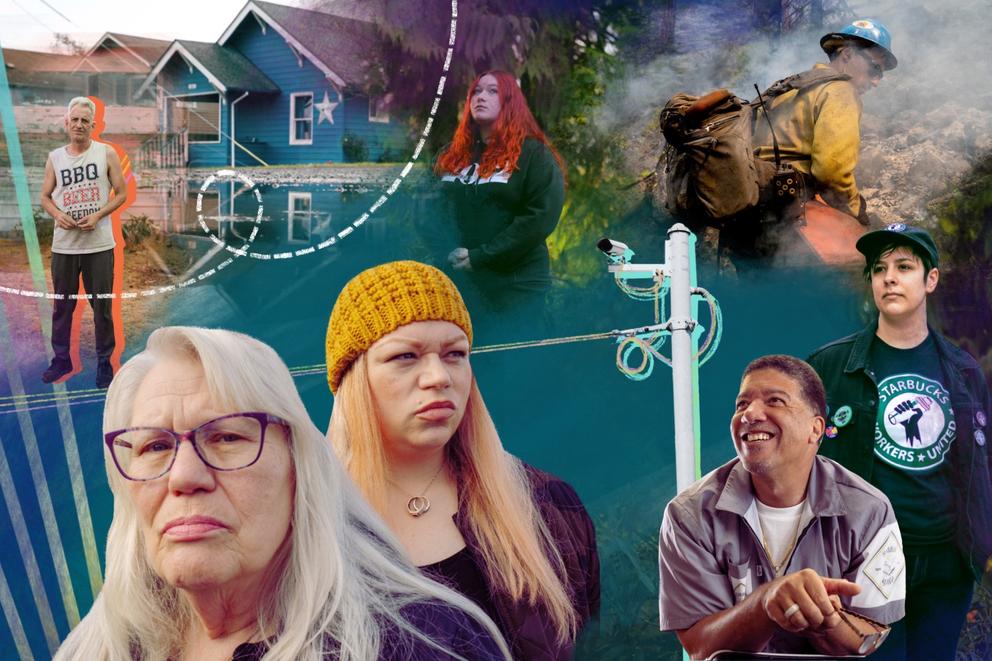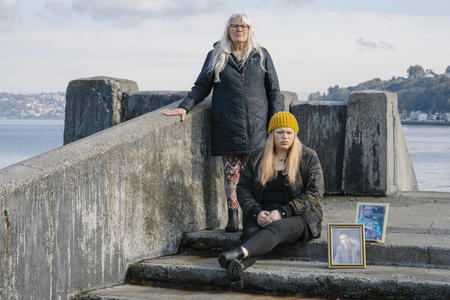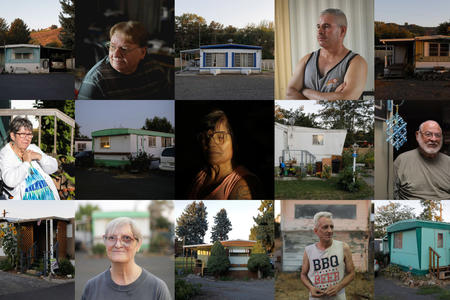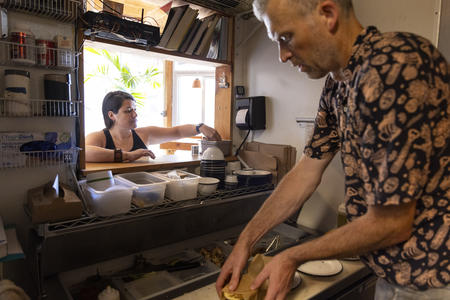The Investigations Desk published more than 40 stories this year in its WA Recovery Watch, WA Workplace Watch and other projects. We worked with our colleagues at Crosscut Now and Crosscut Reports to share that reporting with viewers and podcast listeners.
As a statewide reporting team, we continued to seek stories in which we could drive accountability coverage for rural news deserts or underrepresented communities. Our work also remains free to read and republish. Numerous news organizations across the state shared our reporting with their readers and viewers this year, while other outlets cited our investigations or used data we collected to help tell stories about their own communities.
We believe public interest journalism should empower readers to learn about and engage with their local communities. As part of that mission, we expanded and updated our Follow the Funds reader guide with new local data on federal COVID-19 relief programs. We also launched our Check Your Work guide, where readers can find public tools for searching company safety records, wage violations and labor practice complaints.
Thank you to the readers, sources and fellow journalists who helped support and enrich our coverage this year. Before we step into the next one, here’s a look at some of our biggest and most impactful reporting of 2023.
Pam Felton, left, and Lucy Felton are the mother and sister of Harold Felton (seen in the framed photos), a construction worker who died on the job in a trench collapse in 2016. Six years later, Harold’s boss was sentenced to 45 days in jail on criminal charges relating to the death, the first time an employer was held criminally liable for a worker death. Pam and Lucy have been part of the push to get Washington’s Department of Labor & Industries and King County officials to hold employers accountable for deaths on the job. (M. Scott Brauer for Crosscut)
Investigating work and oversight
We launched WA Workplace Watch in March to shine a light on how jobs and worksites have changed in the wake of the pandemic, as well as how government agencies now regulate them. Reporter Lizz Giordano recently examined how 36-year-old Harold Felton died on the job in 2016 and the complicated search for accountability. In the wake of the story, we heard from concerned safety advocates and state lawmakers. One of Felton’s surviving family members told us: “I can only hope it provides broad awareness and action. … Thank you again.”
Our team also wrote about stalled union negotiations, hiring disputes, farmworker safety rules and other issues. In August, reporter Hannah Weinberger wrote about how wildland firefighters continue to work without respiratory protection despite new regulations to protect most other workers.
“Crosscut did a great dive into the issues in front of us,” the Spokane County Fire District 8 account posted online with the story.
Read other top stories from this project:
- Washington employers push back on new worker heat-protection rules
- Starbucks union fight shows hard road for many toward contract
- King County prosecutor’s office accused of ‘self-dealing’ promotion
- A new WA law may not cure hospital staff shortages, nurses say
We also plan to keep building up the Check Your Work guide in the coming year. For now, you can find information on filing safety complaints, checking for workplace violations or records on union disputes. Share story ideas or tips here.
Jorge Rosales, of Enumclaw, Wash., is a horse trainer who works with 36 horses in the stables at Emerald Downs racetrack. State lawmakers earmarked $1.1 million of Washington’s last pandemic funds to support Emerald Downs, bolstering the racing industry but drawing criticism. (M. Scott Brauer for Crosscut)
A ‘sharp focus’ on federal dollars
Our efforts to watchdog state and local uses of federal pandemic funding continued for a second year as reporter Brandon Block explored how local officials have directed that money into police surveillance tools, business stimulus and horse racing. Our team also tracked transparency and oversight issues around that spending. This ongoing coverage earned the Washington Coalition for Open Government’s annual Kenneth Bunting Award for Outstanding Journalism in February.
“Crosscut’s journalists brought into sharp focus enormous federal spending programs that otherwise would have been difficult for the public to comprehend because of their scale, fragmentation and long time frames,” the Coalition wrote.
We kicked off the year with a three-part series on infrastructure spending as viewed through the needs of the Grays Harbor County community. Our team looked at funding for a coastal levee system, deteriorating bridges and internet access gaps. Each of those stories included short video features on the people and problems involved.
Public officials told us they shared these stories with their policy teams, lawmakers and community groups. A couple regional news stations used the bridge data to report on the structural condition of their local spans.
Our team also dug into housing issues, especially the unique challenges facing mobile home residents as reporter Farah Eltohamy met with tenants struggling to afford rising rental costs. She partnered with reporter Mai Hoang to trace how the Port Orchard-based Hurst & Son LLC management company has bought up dozens of mobile home communities around the state and imposed expensive changes. Just weeks later, the state attorney general’s office announced rent rollbacks and reimbursements at one impacted park.
“[W]e will continue to work on this issue,” state Rep. Mia Su-Ling Gregerson posted after the story.
Read more from this project:
- The WA ‘strike force’ chasing millions in COVID-19 relief fraud
- Washington counties, tribes get more than $110M in federal land aid
- “Community navigators” bridge the healthcare gap for BIPOC groups
- ‘The whole thing is broken’: Temp staffing costs strain WA hospitals
In recent months, we added new hard-to-find or previously unpublished datasets on almost $500 million in business stimulus awards and federal land grants to our Follow the Funds guide. You can also find updated data reports on city and county spending projects.
Partnerships and signal boosts
Our investigative team had the opportunity to collaborate with other newsrooms and help drive national coverage throughout the year. We worked with editors and freelancers to shine a light on youth homelessness and police accountability in addition to sharing our reporting with a variety of regional and community partners.
In collaboration with Youth Today at the Center for Sustainable Journalism, we published a series of five stories and three podcast episodes. We followed the implementation of pilot programs to help young people find housing stability after spending time in state care such as the foster or juvenile justice systems. Reporter Elizabeth Whitman and producer Sam Leeds uncovered a number of service limitations at a new publicly funded hotline program.
Amid that reporting, they also discovered that one service provider had exposed sensitive data on hundreds of clients. Those findings sparked internal investigations at the provider and the state Department of Commerce. Read more from that series:
- WA’s $5M youth homelessness effort is ramping up. Is it working?
- Researchers team up with court staff to help WA homeless youth
- ‘Home was never a place’: One woman’s life in WA foster care
We also worked with nonprofit Type Investigations to dive deep into the outsized role Seattle police officers have played in driving the adoption of bicycle policing as a leading, and controversial, crowd-control technique nationwide.
Other outlets used our reporting to help build context around national reporting such as police technology and worker protections. As part of our journalistic mission, we also offer our stories to republish free of charge. This year our work appeared in InvestigateWest, The Columbian, the Yakima Herald-Republic, GeekWire, KXLY, RANGE Media, The Wenatchee World and a variety of other outlets.
Our staffers also connected with the community in person this year — meeting with visiting international journalists, guest-speaking in classrooms and attending professional conferences.
What’s to come?
While much of our work will continue apace in 2024, our newsroom will join forces with our KCTS 9 colleagues under a new name — Cascade PBS.
We also doubled the size of our investigative team this year, from two staffers to five. A new multimedia journalist will help bring this unique reporting to our broadcast audience.
We will expand our coverage of federally funded programs and infrastructure projects as well as worker safety issues in 2024. We also plan to continue reporting on mobile home communities, criminal justice accountability and other issues.
The Investigations desk received grant support this year from Inatai Foundation and the Ballmer Group. You can read our previous 2022 Investigations Impact Report. If you would like to help boost our public-interest reporting, please share our stories with friends, send us your questions and sign up for our Investigates newsletter.
You can also support our work with a one-time donation or ongoing paid membership.









